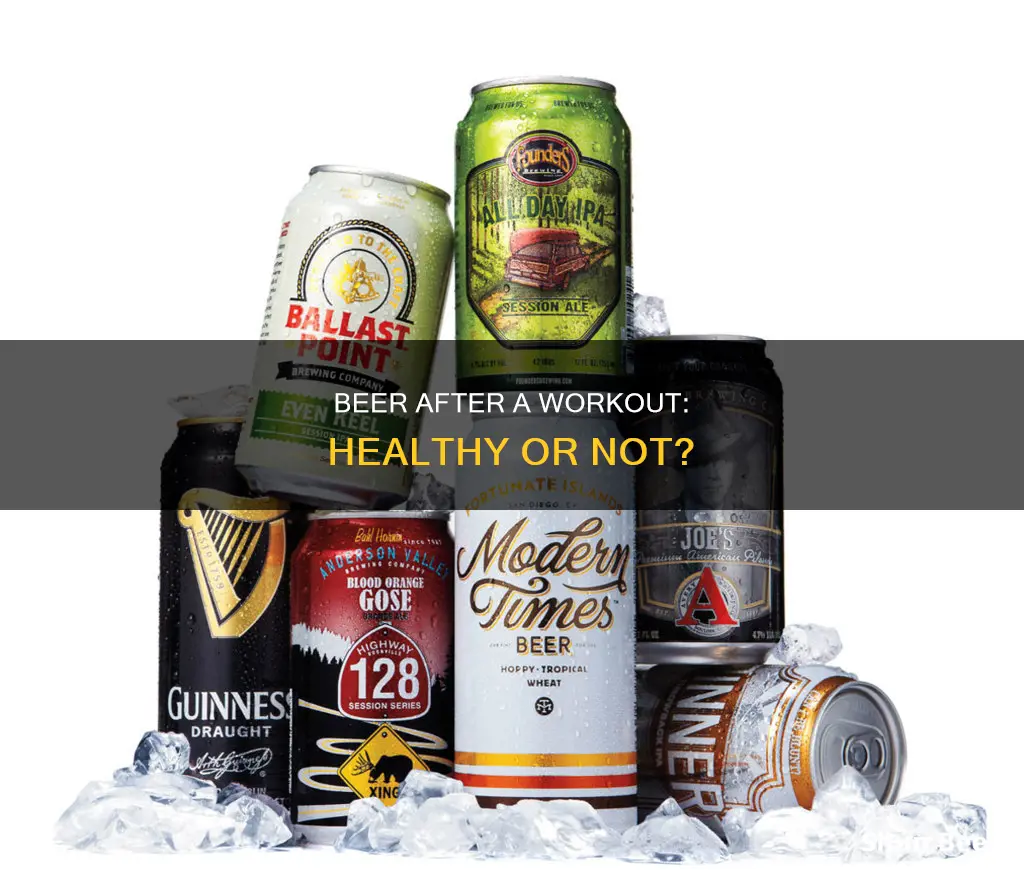
Whether you're an athlete or just trying to stay active, you might have wondered about the effects of drinking beer after a workout. After all, it's a common ritual for many people, and some events even offer alcoholic drinks throughout or at the finish line. So, is it a harmless tradition or a detrimental habit?
Well, it's a bit of a mixed bag. On the one hand, beer can provide some electrolytes and carbohydrates, which can be beneficial after a tough workout. However, it's important to note that the type of electrolyte in beer (potassium) is not the main one lost through sweat. Additionally, the carbohydrates in beer come at a cost, as your body needs to use valuable nutrients to metabolise the alcohol.
One of the main concerns with drinking beer after a workout is dehydration. Alcohol is a diuretic, which means it increases urine production and can leave you feeling even more dehydrated, especially after a sweaty session. Weight gain is also a potential issue, as alcohol is a source of 'empty calories', providing energy but little nutritional value.
So, while the occasional beer after a workout won't harm you, it's not the best choice for optimal recovery. If you're looking to build muscle and improve performance, you might want to opt for a non-alcoholic beer, a recovery drink, or some good old H2O.
| Characteristics | Values |
|---|---|
| Dehydration | Alcohol is a diuretic, which encourages the body to produce more urine and lose fluids. |
| Rehydration | Beer with an ABV of less than 4% can be effective for rehydration after exercise. |
| Electrolytes | Beer contains some electrolytes, but it is not a significant source of sodium chloride, the main electrolyte lost through sweat. |
| Carbohydrates | Beer contains carbohydrates, which can help replenish energy stores after long or intense workouts. |
| Protein synthesis | Alcohol inhibits protein synthesis, which is necessary for muscle repair and growth. |
| Weight gain | Alcohol provides "empty calories", which can contribute to weight gain. |
| Sleep | Alcohol can negatively impact sleep quality, which is important for workout recovery. |
| Social benefits | Drinking beer after a workout can encourage social interaction and regular exercise. |
What You'll Learn

Beer can be a good source of carbs and electrolytes
Beer contains wheat, hops, grains, and yeast, which provide around 10 to 15 grams of carbohydrates. A light-bodied wheat beer or session India pale ale (IPA) can help restore lost carbs and calories after a long, challenging workout.
Beer also contains electrolytes such as potassium, sodium, magnesium, and calcium, which are lost through sweat during exercise. These electrolytes help to maintain fluid balance and prevent muscle cramps, and support overall bodily function. However, it is important to note that beer is not a significant source of sodium chloride, the main electrolyte lost through sweat.
Some manufacturers have begun producing "fitness beers," which are lower in alcohol content and may be enhanced with additional minerals to further aid in workout recovery.
While beer can provide some nutritional benefits, it is not a perfect recovery drink. It is important to consume beer in moderation and to prioritise hydration with non-alcoholic beverages, especially after a sweaty workout.
Truly's vs Beer: Which is the Healthier Drinking Option?
You may want to see also

It can help you stay hydrated
Drinking beer after a workout can help you stay hydrated, but only if you're drinking the right kind of beer. A study published in the International Journal of Sport Nutrition and Exercise Metabolism found that light beer with an alcohol content of less than 4% can be effective as a post-workout hydrator. In fact, it can be just as good as water in some aspects.
Beer contains carbohydrates and sodium, which can be beneficial after a workout. It's also tastier than water, which may make you more likely to rehydrate. However, it's important to keep in mind that drinking too much beer or beer with a higher alcohol content can actually dehydrate you. This is because alcohol is a diuretic, which means it makes your body produce more urine. It can also interfere with your body's ability to absorb protein and replace lost electrolytes.
If you're looking to stay hydrated after a workout, it's best to stick to low-ABV beers and drink them in moderation. It's also a good idea to have food or a non-alcoholic beverage with your beer, as this can help replace lost electrolytes and prevent dehydration.
So, while beer can help you stay hydrated after a workout, it's important to choose the right kind of beer and drink it in moderation as part of a balanced meal or snack.
Beer and Diabetes: What's the Verdict?
You may want to see also

It can slow down muscle recovery
Drinking beer after a workout can slow down muscle recovery. Alcohol inhibits protein synthesis, which is the process by which muscles grow and repair. A study found that consuming the equivalent of about seven beers for a 150-pound person suppressed muscle protein synthesis by 24 to 37%. Even when paired with protein, the suppressive effect of alcohol on muscle protein synthesis remained.
Alcohol also impairs workout recovery by elevating cortisol levels, decreasing testosterone levels, and inhibiting testosterone synthesis. Testosterone is the primary male sex hormone, and higher levels of it make it easier and faster to build muscle mass. Therefore, the decrease in testosterone levels due to alcohol consumption can slow down muscle recovery.
Additionally, alcohol is dehydrating, which is the opposite of what you want after a workout. Dehydration will make it harder for your muscles to recover, leading to a longer recovery time and reduced fitness gains. When your muscles are already dehydrated after a workout, drinking alcohol will further dehydrate them, preventing them from rebounding and repairing effectively.
Furthermore, a study by the Department of Clinical Physiology at the Karolinska Institute of Sweden found that alcohol consumption decreased glucose absorption in the legs and significantly reduced blood flow, possibly due to constriction of the muscle vessels. This can lead to the "heavy legs" effect, where athletes experience reduced energy and oxygen supply to their muscles the day after drinking alcohol.
Beer Nuts: Healthy Snack or Unhealthy Indulgence?
You may want to see also

It can negatively impact your sleep
Drinking beer after a workout may be a common practice, with some sources suggesting that it can have certain benefits. However, it is important to consider the potential negative impacts, one of which is its effect on sleep. Even a single drink can negatively impact your sleep quality, and when it comes to post-workout drinking, this disruption can have a detrimental effect on your body's recovery process.
Alcohol is a depressant, and while it may help you fall asleep faster, these effects are short-lived. As your body works to eliminate the alcohol from your system, you become more likely to wake up during the night. This is because the production of adenosine, a sleep-inducing chemical in the brain, increases while drinking but quickly subsides, making it difficult to stay asleep. Additionally, alcohol inhibits REM sleep, which is considered the most mentally restorative phase.
Research has shown that alcohol significantly affects sleep quality, regardless of consumption level. A study found that low alcohol intake reduced sleep quality by 9.3%, moderate intake by 24%, and heavy intake by nearly 40%. These effects are similar across men, women, and active and sedentary individuals, with younger people experiencing a more significant impact on their sleep.
When you drink after a workout, you risk disrupting the recovery process. Exercise causes physiological changes in your body, and adequate sleep is crucial for muscle repair and growth. By interfering with your sleep, alcohol can hinder this process, leading to longer recovery times and reduced fitness gains.
To minimize the impact on your sleep, it is recommended to allow a minimum of three hours between your last drink and bedtime. Drinking water along with alcohol and having a meal can also help mitigate its effects. However, it is important to prioritize rehydration and proper nutrition after a workout, as this will support your body's natural recovery process and promote better sleep.
Beer vs Water: Which is Healthier?
You may want to see also

It's better than liquor as a post-workout drink
Beer may be a better post-workout drink than liquor, but it's important to understand the context. Firstly, let's acknowledge that the occasional drink after a workout won't derail your fitness progress, as long as other factors like sleep and overall caloric intake are in check. Now, here's why beer may be a better choice than liquor:
Lower Alcohol Content
Beer, specifically low-ABV beer (less than 4% alcohol), can be a more effective post-workout hydrator than liquor. This is because liquor tends to have a higher alcohol content, and once you go over 4% alcohol, the benefits of hydration decline, and you risk higher water loss, reduced muscle gains, and increased body fat.
Electrolytes and Carbohydrates
Beer contains more electrolytes and carbohydrates than liquor. After a workout, your body needs to replenish lost electrolytes and carbohydrates to aid in recovery. While liquor provides little to no nutritional value, beer provides some electrolytes (like potassium) and carbohydrates, which can be beneficial.
Taste and Enjoyment
Beer has a more appealing taste than liquor for many people, and it can make the act of rehydrating more enjoyable. This may encourage people to rehydrate more effectively, which is crucial for exercise recovery.
Polyphenols
Beer contains polyphenols, which are antioxidant and antiviral plant compounds. These polyphenols could boost your immune system and reduce the chances of respiratory infections associated with heavy training.
Social Aspect
Drinking beer after a workout can have social benefits, encouraging camaraderie and a sense of celebration. This social aspect of sharing a beer with teammates or friends may positively impact overall well-being and motivation to exercise.
In summary, while beer may be a better post-workout drink than liquor, it's important to consume it in moderation and alongside plenty of water and nutritious food. Excessive alcohol consumption will hinder your fitness progress and impair your recovery.
Spirits vs Beer: Which Alcoholic Beverage is Healthier?
You may want to see also
Frequently asked questions
Beer can be a decent recovery aid after exercise, but it is not a perfect recovery drink. It is best to have no more than one or two low-ABV beers.
Beer can be a good source of carbohydrates and electrolytes, which can be beneficial post-exercise. It can also be a good way to socialise after a workout.
Yes, beer can dehydrate you, affect your meal plan, lead to more injuries, and impair your sleep. It can also slow down your body's ability to recover and build muscle.
Some alternatives include non-alcoholic beer, mocktails, recovery drinks, chocolate milk, protein shakes, orange juice, and coconut water.
It is recommended to wait at least one hour between finishing your workout and having your first beer. This gives your body time to replenish electrolytes and rehydrate with water.







